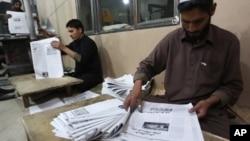Afghanistan's media have reacted strongly to Taliban threats against two major television networks over coverage of the insurgent group's recent occupation of the northern city of Kunduz.
During a Tuesday news conference representing most of Afghanistan's major media outlets, journalists said any attack against Tolo TV or 1 TV would be considered an attack against "Afghanistan's media family," and lead to a media-wide boycott against the insurgents, followed by "other measures," without elaborating.
"Media organizations are not one of the warring sides but civilian organizations," Afghan journalists said in a joint statement, adding that an attack on the media would be considered a "war crime." The statement also called on government officials to take action to protect press freedom, which they described as "one of the key achievements of the past 14 years."
Tolo and 1 TV reporters and editors attended the news conference but mostly remained quiet and did not answer any questions.
The presidential palace said in a statement Tuesday that freedom of the press is a pillar of democracy and that protecting the values of freedom of the press is the state's duty. The statement also said the Afghan government will not hesitate in protecting its citizens and particularly the media.
The Taliban on Monday described Tolo TV and 1 TV as propaganda arms of "infidels."
"Henceforth no employee, anchor, office, news team and reporter of these TV channels holds any immunity," according to a statement published on its website. "Hereafter all the reporters and associates of these channels will be deemed enemy personnel, all of their centers, offices and dispatched teams will be considered military objectives which will be directly eliminated."
The Taliban also accused these channels of receiving funding from the U.S. embassy to spread "profanity" and "lewdness" in Afghanistan and told people to boycott the stations.
One of the reports that seemed to have particularly angered the insurgents was related to a Taliban attack in Kunduz. Tolo TV reported the Taliban attacked a hostel for women and raped students.
Human rights group Amnesty International also reported harrowing stories emerging from Kunduz residents, including mass murder, gang rapes and house-to-house searches by Taliban death squads. Taliban spokesman Zabihullah Mujahid rejected the allegations as baseless in a Pashto language statement issued to VOA.
The Taliban stormed Kunduz September 28, holding the city for three days before government forces drove them back.
A Taliban spokesman Tuesday said the group has completely withdrawn from Kunduz in an effort to avoid further civilian casualties.
In an email sent to VOA and other media outlets, a spokesman said the group's fighters were withdrawing "from the main square markets and government buildings to the outlying rural areas of the city in order to reinforce their defense lines and reserve their strength for effective future operations."
